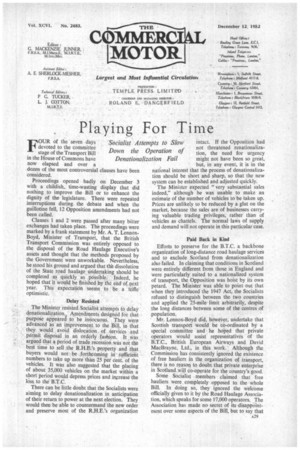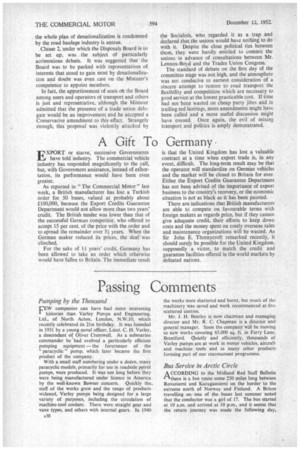Playing For Time
Page 31

Page 32

If you've noticed an error in this article please click here to report it so we can fix it.
FOUR of the seven days devoted to the committee stage of the Transport Bill in the House of Commons have now elapsed and over a dozen of the most controversial clauses have been considered.
Proceedings opened badly on December 3 with a childish, time-wasting display that did nothing to improve the Bill or to enhance the dignity of the legislature. There were repeated interruptions during the debate and when the guillotine fell, 12 Opposition amendments had not been called.
Clauses 1 and 2 were passed after many bitter exchanges had taken place. The proceedings were marked by a frank statement by Mr. A. T. Lennox. Boyd, Minister of Transport, that the British Transport Commission was entirely opposed to the disposal of the Road Haulage Executive's assets and thought that the methods proposed by the Government were unworkable. Nevertheless, he stood his ground and argued that We dissolution of the State road haulage undertaking should be completed as quickly as possible. Indeed, he hoped that it would be finished by the endof next year. This expectation Seems to be a trifle optimistic.
Delay Resisted The Minister resisted.Socialist attempts to delay denationalization, Amendments designed for that purpose appeared to be innocuous. They were advanced as an improvement to the Bill, in that they would avoid dislocation., Of services and permit disposal in an orderly fashion. It was argued that a period of trade recession was not the _ .
best time to sell the R.H.E.'s property and that buyers would not be _forthcoming in ' Sufficient numbers to take up more than 25 per cent, of the vehicles. It was also suggested that the placing of about 35,000 vehicles on the market within a short period would depress prices and increase the lass to the B.T.C.
There can be little doubt that the Socialists were aiming to delay denationalization in anticipation of their return to power at the next election. They would then be able to countermand the new order and preserve most of the R.H.E.'s organization intact. If the Opposition had not threatened renationalization, the need for urgency might not have been so great, but, in any event, it is in the national interest that the process of denationalization should be short and sharp, so that the new system can be established and adjusted quickly. The Minister expected "very substantial sales indeed," although he was unable to make an estimate of the number of vehicles to be taken up. Prices are unlikely to be reduced by a glut on the market, because the sales are of businesses carrying valuable trading privileges, rather than of vehicles as chattels. The normal laws of supply and demand will not operate in this particular case.
Paid Back in Kind Efforts to preserve for the B.T.C. a backbone organization of long-distance road haulage services and to exclude Scotland from denationalization also failed. In claiming that conditions in Scotland were entirely different from those in England and were particularly suited to a nationalized system of transport, the Opposition was hoist by its own petard. The Minister was able to point out that when they introduced the 1947 Act, the Socialists refused to distinguish between the two countries and applied the 25-mile limit arbitrarily, despite the long distances between some of the centres of population. Mr. Lennox-Boyd did, however, undertake that Scottish transport Would be cb-ordinated by a special committee and he hoped that private operators would assist representatives of the B.T.C., British European Airways and David MacBrayne. Ltd., in this work. Although the Commission has consistently ignored the existence of free hauliers in the organization of transport, there is no reason to doubt that private enterprise in Scotland.will co-operate for the country's good. Some Socialist members claimed that free hauliers were completely opposed to thewhole Bill. In doing so, they ignored the welcome officially given to it by the Road Haulage Association, which speaks for some 17,000 operators. The Association has made no secret of its disappointment over some aspects of the Bill, but to say that the whole plan of denationalization is condemned by the road haulage industry is untrue.
Clause 2, under which the Disposals Board is to be set up. was the subject of particularly acrimonious debate. It was suggested that the Board was to be packed with representatives of interests that stood to gain most by denationalization and doubt was even cast on the Minister's competence to appoint members.
In fact, the apportionment of seats on the Board among users and operators of transport. and others is just and representative, although the Minister admitted that the presence of a trade union delegate would be an improvement and he accepted a Conservative amendment to this effect. Strangely enough, this proposal was violently attacked by the Socialists, who regarded it as a trap and declared that the unions would have nothing to do with it. Despite the close political ties between them, they were hardly entitled to commit the unions in advance of consultations between Mr. Lennox-Boyd and the Trades Union Congress.
The standard of debate on the first day of the committee stage was not high, and the atmosphere was not conducive to earnest consideration of a sincere attempt to restore to road transport the flexibility and competition which are necessary to good service at the lowest practicable cost. If time had not been wasted on cheap party jibes and in trailing red herrings, more amendments might have been called and a more useful discussion might have ensued. Once again, the evil of mixing transport and politics is amply demonstrated.




























































































